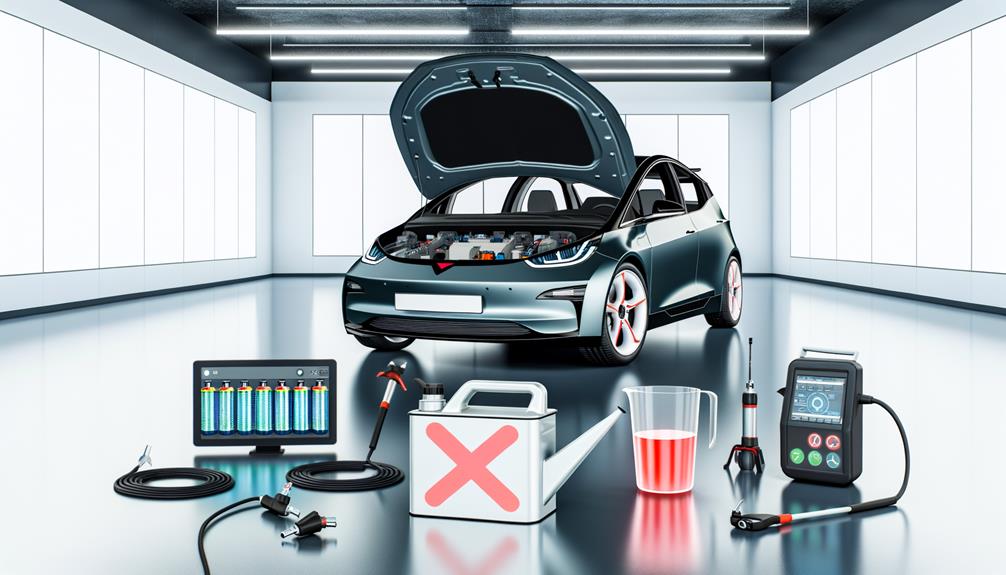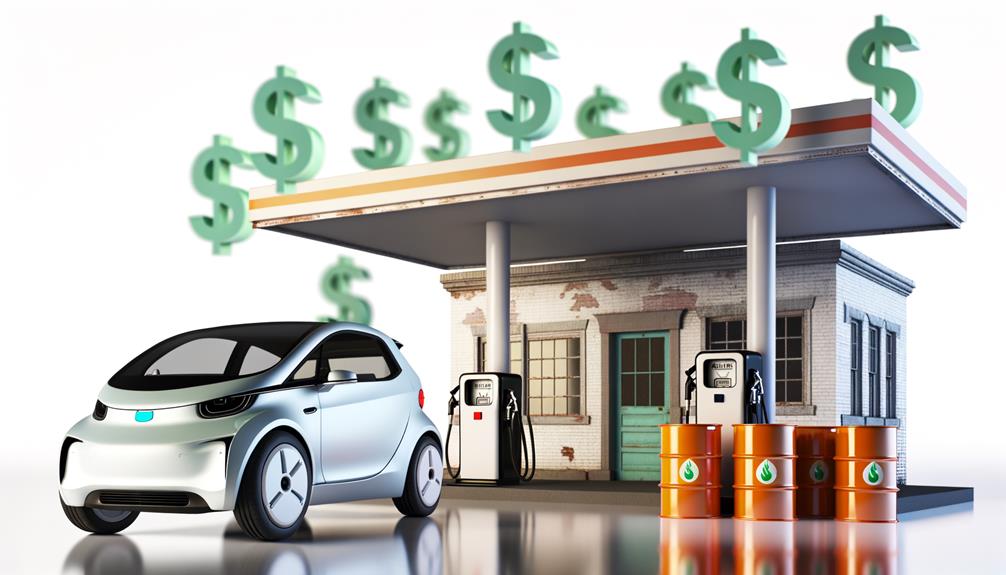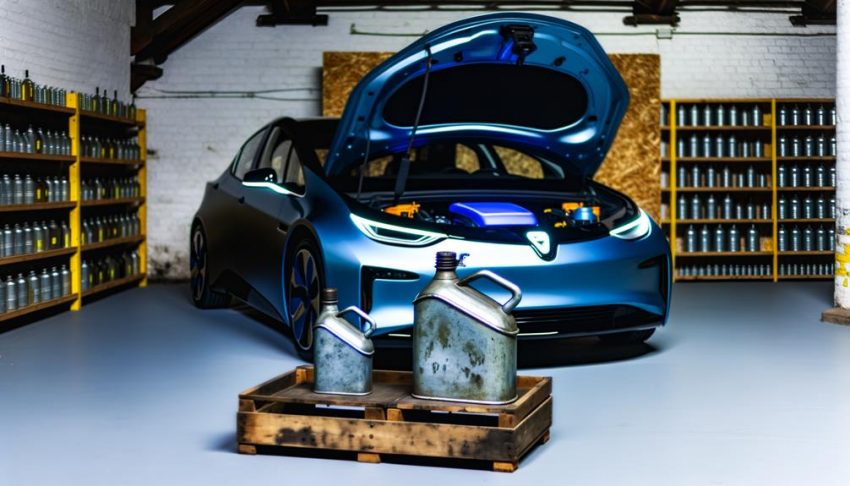You might be wondering if electric cars need oil like traditional vehicles. While conventional cars rely on oil for lubrication and engine health, electric cars don't have internal combustion engines, meaning they don't use oil in the same way. Instead, electric vehicles have fewer moving parts and require different fluids, such as transmission fluid and brake fluid. This difference not only simplifies maintenance but also reduces environmental impact. But what exactly are the maintenance requirements for electric cars, and how do they compare cost-wise? Let's explore what sets electric vehicles apart in this regard.
Contents
Differences in Drivetrain
In the domain of automotive technology, the differences in drivetrain between electric vehicles (EVs) and traditional combustion-engine vehicles are profound. Electric cars use electric motors instead of internal combustion engines, fundamentally altering the maintenance landscape. Unlike traditional vehicles, which have numerous moving parts that require lubrication—such as pistons, valves, and crankshafts—electric motors operate with considerably fewer mechanical components. This vital difference means EVs demand less maintenance.
Traditional vehicles rely heavily on oil changes to keep their engines running smoothly. The internal combustion engine accumulates metal flakes and contaminants over time, necessitating frequent oil changes to avoid damage and maintain performance. In contrast, the drivetrain of an electric vehicle is designed for efficiency, utilizing electric power and magnetic fields to generate movement. This eliminates the need for oil changes, as there's no oil-dependent engine to maintain.
Moreover, the absence of metal-on-metal contact in EV drivetrains drastically reduces wear and tear, a common issue in conventional vehicles. The electric motor's streamlined design translates to fewer moving parts that require lubrication, further reducing the potential for mechanical failure. Consequently, EV maintenance tasks are simplified and occur less frequently compared to those required by internal combustion engines.
Essential Fluids for EVs
While electric vehicles don't require traditional engine oil, they still depend on various fluids to guarantee peak performance and longevity. Understanding these essential fluids is significant for maintaining your EV's mechanical components and ensuring consistent performance.
First, let's talk about transmission fluid. Unlike conventional oil, transmission fluid in EVs lubricates the transmission components and typically needs replacement only once or twice in the vehicle's lifetime. This fluid is fundamental for reducing friction and wear on the gears, ensuring smooth operation.
Next is engine coolant. Despite the absence of a combustion engine, EVs generate heat, particularly in the battery and inverter. Engine coolant is critical for thermal management, preventing overheating and maintaining ideal operating temperatures. Typically, you should replace engine coolant after approximately 49,000 miles to guarantee efficient performance and longevity of your vehicle.
Brake fluid is another significant element. EVs use a braking system similar to conventional vehicles, requiring brake fluid to function correctly. Regular maintenance of brake fluid is necessary, with a recommended replacement interval of every two years or around 24,000 miles. This guarantees reliable braking performance and safety.
Here's a quick summary of these essential fluids:
| Fluid Type | Purpose | Replacement Interval |
|---|---|---|
| Transmission Fluid | Lubricates transmission components | Once or twice in a vehicle's lifetime |
| Engine Coolant | Prevents overheating of battery and inverter | Every 49,000 miles |
| Brake Fluid | Ensures proper braking system function | Every two years or 24,000 miles |
Regular checks of these fluids are critical for maintaining the performance and safety of your EV, even though they have fewer fluid maintenance needs compared to traditional combustion engines. Always adhere to the manufacturer's guidelines to keep your electric vehicle running effectively.
Maintenance Frequency

Maintaining your electric vehicle (EV) entails regular checks and replacements of key fluids and components to guarantee peak performance. Unlike traditional cars, EVs have fewer moving parts, which generally reduces the maintenance frequency. For instance, conventional vehicles require oil changes every 5,000 to 7,500 miles, whereas EVs bypass this necessity entirely due to the absence of an internal combustion engine.
When it comes to brake fluid, EVs demand similar attention as traditional cars. It's recommended to replace the brake fluid every 40,000 kilometers (25,000 miles) to ascertain the braking system remains effective. Regular inspections of important components, including the battery and gearbox lubrication, should be conducted annually or bi-annually based on your driving habits. These inspections help identify potential issues early, assuring the longevity and reliability of your EV.
Fluid checks for electric vehicles are typically performed every 7,500 miles. This includes examining the coolant, which is essential for maintaining the battery's ideal temperature, and confirming the brake fluid is at appropriate levels. Cabin air filters, which contribute to the air quality inside your vehicle, should be replaced every 36,000 miles. This replacement guarantees a clean and healthy environment for passengers.
EV manufacturers often provide detailed maintenance schedules tailored to their specific models, making it easier for you to keep track of necessary services. By adhering to these guidelines and conducting regular inspections, you can extend the lifespan of your EV while maintaining its performance and efficiency. Understanding and following the recommended maintenance frequency is critical to maximizing the benefits of owning an electric vehicle.
Environmental Impact
Understanding the maintenance frequency of electric vehicles (EVs) brings us to another significant aspect—environmental impact. Unlike traditional cars, electric cars don't need oil changes, which translates to a substantial reduction in waste oil generation. This is vital because waste oil is a significant pollutant, contributing to soil and water contamination. EVs use fewer consumables in their maintenance practices, consequently aligning with eco-friendly initiatives.
The shift from oil dependency in EVs mitigates risks associated with oil extraction and transportation, such as oil spills. These spills have long-lasting detrimental effects on ecosystems and biodiversity. EVs, thus, represent a sustainable alternative that reduces these environmental hazards.
Greenhouse gas emissions are another important factor. Traditional cars emit high levels of carbon dioxide (CO₂) and other greenhouse gases, exacerbating climate change. EVs, on the other hand, produce zero tailpipe emissions. This dramatic reduction in greenhouse gas emissions makes EVs pivotal in efforts to combat global warming.
EVs also utilize regenerative braking systems, which convert kinetic energy back into stored energy, reducing the need for frequent brake pad replacements. Traditional cars typically wear out brake pads faster, leading to more frequent replacements and increased waste. The reduced brake pad wear in EVs contributes to a lower ecological footprint, as it minimizes the environmental impact associated with manufacturing and disposing of brake components.
Cost Implications

When evaluating the cost implications of owning an electric vehicle (EV), one of the most compelling factors is the markedly lower overall maintenance expenses compared to internal combustion engine vehicles. Electric Car Maintenance is considerably simpler, primarily because EVs are powered by electric motors that have fewer moving parts that require lubrication.
Traditional cars need oil changes every 5,000 to 7,500 miles, but EVs eliminate this necessity entirely, saving you hundreds of dollars over the lifespan of the vehicle. Additionally, the regenerative braking systems in EVs contribute to less wear on brake pads, further reducing maintenance costs. Here are some key points to take into account:
- No engine oil changes: Traditional cars need oil changes regularly, which is a recurring cost you won't incur with an EV.
- Fewer moving parts: EVs have fewer components that need to be replaced, minimizing the likelihood of mechanical failures.
- Regenerative braking: This advanced brake management system means EVs experience less wear on brake pads, leading to fewer replacements.
- Battery replacement: While this can be costly, ranging from $1,000 to $6,000, the frequency is low and often covered by warranties.
- Long-term savings: Despite higher upfront costs, the reduced maintenance and fuel expenses make EVs economical over time.
It's essential to note that battery replacement can be a considerable expense, but it's relatively infrequent and EV batteries are continually improving in longevity and efficiency. The overall savings in Electric Car Maintenance, combined with lower fuel costs, make owning an EV a financially sound decision. By understanding these cost implications, you can make an informed decision on whether an electric vehicle is right for you.
Frequently Asked Questions
What Fluids Do Electric Cars Need?
For electric cars, you'll need to monitor battery maintenance, coolant types for thermal management, brake fluid, windshield washer fluid, power steering fluid, and tire pressure. Regular checks of fluid levels, regenerative braking systems, and fluid recycling guarantee peak performance.
Can Electric Cars Run Without Oil?
Yes, electric cars can run without oil due to their electric motor and regenerative braking systems. Instead, focus on battery maintenance and charging infrastructure. Electric vehicles boast better energy efficiency, lower maintenance costs, and reduced environmental impact.
Do Electric Cars Need Transmission Fluid?
Yes, electric cars need transmission fluid for gearbox function and drivetrain efficiency. Regular electric vehicle maintenance guarantees proper lubrication systems, cooling systems, and EV performance. Fluid types vary, so follow manufacturer guidelines for vehicle longevity and electric motor health.
Do Electric Cars Need Antifreeze?
Yes, electric cars need antifreeze. Electric vehicle maintenance includes checking the cooling system for ideal thermal management, selecting the right antifreeze types for battery performance, and making seasonal adjustments. Regular coolant replacement guarantees engine efficiency and prevents overheating.
Conclusion
To sum up, you won't need to worry about oil changes with electric vehicles, thanks to their electric motors and simplified drivetrains. Instead, focus on essential fluids like transmission fluid, engine coolant, and brake fluid, which require less frequent maintenance. This translates to lower costs and reduced environmental impact. Embracing EVs means you're opting for a more sustainable and cost-effective solution, greatly minimizing both your maintenance expenses and your carbon footprint.
